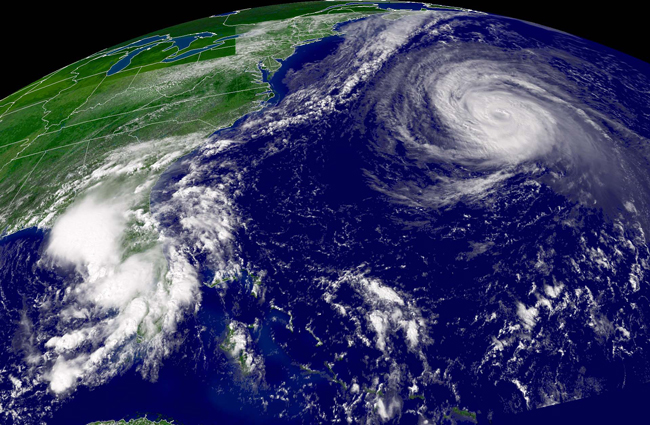
Florida is about to sail through another hurricane season — its eighth consecutive — free from a named storm severely pounding the state’s shores.
With Saturday the last official day of this year’s hurricane season, credit a combination of atmospheric conditions for keeping down the number of storms that threatened Florida.
“Even though the storms could generate some fuel from the ocean, more wind shear came in over the Atlantic than we really thought might happen, and there was a lot of Saharan dust that blew off Africa, so there wasn’t a whole lot of energy for them to really get strong,” state meteorologist Amy Godsey said Monday.
The pre-season forecast for the June-through-November storm season for the Atlantic and Caribbean was for 12 to 18 named storms, with between six and 10 reaching hurricane status.
The Atlantic and Caribbean region did record 13 named storms this year, of which only two grew into hurricanes, both in September and both category 1.
Humberto formed off Cape Verde, while the deadly Ingrid landed in Tamaulipas, Mexico.
The number of hurricanes was the lowest for a year in the Atlantic since 1994, Godsey said.
Godsey said it’s just a matter of luck for Florida, which has avoided hurricanes since the 2004 and 2005 seasons when seven hit the state.
“If the ocean currents and steering currents and the atmosphere were just shifted a little bit, those two hurricanes might have come to the United States,” she said. “So it could have been a very different year for us if just a few things had been tweaked.”
The first of the named tropical storms this year did cause some widespread flooding in South Florida, while two other tropical systems provided a few moments of concern for emergency managers.
“We started off with tropical storm Andrea and we thought we were in for the long haul, but it turned out to be one of the quietest years on record, which we’re pleased about,” said Bryan Koon, director of the Florida Division of Emergency Management. “Every year that Florida doesn’t have a hurricane is better for the citizens of Florida.”
Andrea swept through the Big Bend the first week in June, with its outer bands dumping more than 13 inches of rain into areas of South Florida.
But afterward, the season was relatively calm for Floridians.
In early August, tropical storm Dorian regenerated into a tropical depression just east of Florida, while tropical storm Karen did threaten the Gulf Coast — causing the Federal Emergency Management Agency and the U.S. Department of Interior to call furloughed workers back from the federal government shutdown — before breaking up prior to reaching Northwest Florida in early October.
The lack of Florida impacts is good news for property owners, as the state’s Florida Hurricane Catastrophe Fund, which provides back-up coverage for insurers, has reached what is considered its best-ever fiscal shape.
The growth in financial reserves also provides a cushion in the event claims need to be paid in coastal areas by the state-backed Citizens Property Insurance Corporation. If Citizens or the catastrophe fund don’t have enough money in reserves to pay hurricane claims, property owners throughout the state can get hit with extra charges known as assessments.
“We are stronger as an overall insurance system, able to quickly handle claims from most hurricanes and without or with lower statewide assessments,” Sam Miller, executive vice president of the Florida Insurance Council, said in an email. “Without healthy cash on hand, there might be assessments from both which would produce significant increase in rates.”
With a focus on other potential disasters befalling the state over the next few months, including the annual threat of wildfires, emergency management officials now head into another off-season trying to remind people not to become complacent about future storm preparations.
“There is, however, the potential for the longer you go without hurricanes for people to forget the impacts of hurricanes and tropical storms and the devastating impacts that they can have,” Koon said. “As more and more people move to Florida each year, we need to make sure that we continue to do a good job of educating our citizens about the potential for those storms, because we will have them again.”
–Jim Tunrner, News Service of Florida






























Stormy says
Well now you’ve done it. You JINXED us ! Now we are sure to get slammed next summer. I heard the names of next years hurricanes will be named after all the insane entertainers out there….M-Hurricane Miley…..K-Hurricane Kim……L-Hurricane Linsey……G-Hurricane Gaga…..C-Hurricane Crist (Sorry, couldn’t resist).
rhweir says
Tick, tick, tick, tick, tick…
Genie says
Just wait until everyone gets a look at the new federal flood insurance rates.